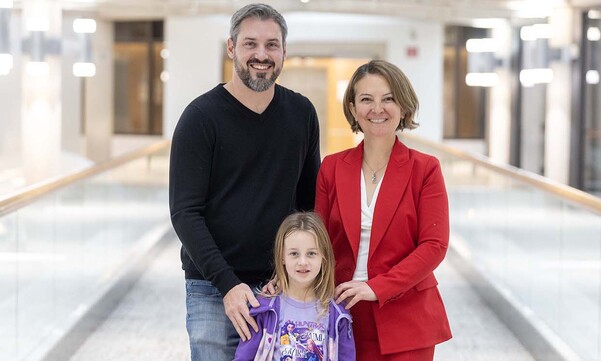Fourteen years after his gastric bypass surgery, Donald Rice of Durham is a confident 46-year-old father who enjoys being active and social. Yet he can still recall when he weighed 339 pounds and felt anxious about the changes that would follow his bariatric surgery. Knowing how different his life is today, he is glad he didn’t let fear hold him back. “There are so many positives that changed my life that what I gave up doesn’t matter," he said. "It doesn’t even cross my mind.”
Overcoming Fear of Weight Loss Surgery
Rice had a lot to worry about when he was considering gastric bypass. He didn’t want to tell his friends because he wondered what they might think. He was afraid the surgery would change his relationship with the foods he loved and the good times he spent socializing around a table.
Rice was also concerned about the surgery itself and the lifestyle changes he would have to make. He would ask himself, “‘if something goes wrong, am I strong enough to say I made the right choice and continue with other steps if follow-up procedures are needed?’”
However, Rice’s biggest fear was what would happen if he didn’t go through with the procedure. Then 32, he was already pre-diabetic and taking medicine to control his cholesterol.
At one of his first meetings with the Duke bariatric team in Durham, Rice, learned obesity could rob him of many years of life.
Rice’s daughter was a toddler at the time. He wanted to stick around. He wanted to be a positive role model as she grew up. “That pushed me to not let my fears get in the way of what I needed to do,” he said.
More Positives Than Anticipated
Rice lost more than 100 pounds in the first year following surgery, and the effects were dramatic.
As his appearance changed, his confidence grew. Rice was promoted to an IT manager and featured in his company's marketing materials. He had more energy for activities he used to enjoy -- running, playing basketball, and added some new ones, like dancing and becoming a certified Zumba instructor. At one point, he remembers playing basketball with a guy 10 years younger than him. “I just tried to personally run that whole game, just to tire him out. That became my goal. That feeling was amazing.”
He stopped feeling anxious about finding a seat – on a friend’s couch, on an airplane or in a movie theater. When you’re large, he recalled, “you always feel people are looking at you or away from you in hopes you don’t sit beside them. That is so uncomfortable.”
His shopping habits changed too. “The ability to shop at any store you want,” he said, “that was awesome. When you’re a big guy, it seemed like every shirt had the word ‘big’ on it. You’re like, ‘I already know this.’ Now I have a variety of clothes that fit me and I look good in. It all feeds into your confidence.”

Reality Sets in: Eating Healthy, not Just Less
When the weight dropped, Rice thought he had it easy. He took the vitamins required after surgery, ate less, and participated in mud runs, triathlons, and other sports. But as the years went by and he grew older, his stomach started to expand. His meals got bigger. He started gaining back some of the weight. He thought his active lifestyle would compensate for that.
In the beginning, he said, “you’re losing weight, not because you’re eating well, but because you’re just not eating a lot. It never crossed my mind that I could go back to eating a decent sized meal. You’ll hear from the physicians and trainers that your diet is more important than your exercise. Now I’m working toward that.”
Positives Outweigh His Regrets
Today, Rice is about 25 pounds above his ideal weight, and he’s focused on getting back to it. Thinking back on his experience, he wishes he had done some things differently. “I regret that I didn’t have surgery to remove my hanging flesh when I lost all that weight. I wish I had paid attention and took advantage of the nutritionists’ services and materials” after his surgery. Now he’s working with an independent health coach who counsels him on food shopping and portion control.
In all, the positives he’s experienced far outweigh his regrets. No longer on medication for cholesterol or considered pre-diabetic, Rice knows he has a healthy life ahead. He feels he has been a positive role model for his now 16-year-old daughter and plans to enjoy his future.
“Some people are scared of tomorrow,” he said. “I’m embracing it. I have desire and energy for my job and feel that physically I will live well in retirement. I’m looking forward to what comes next.”





